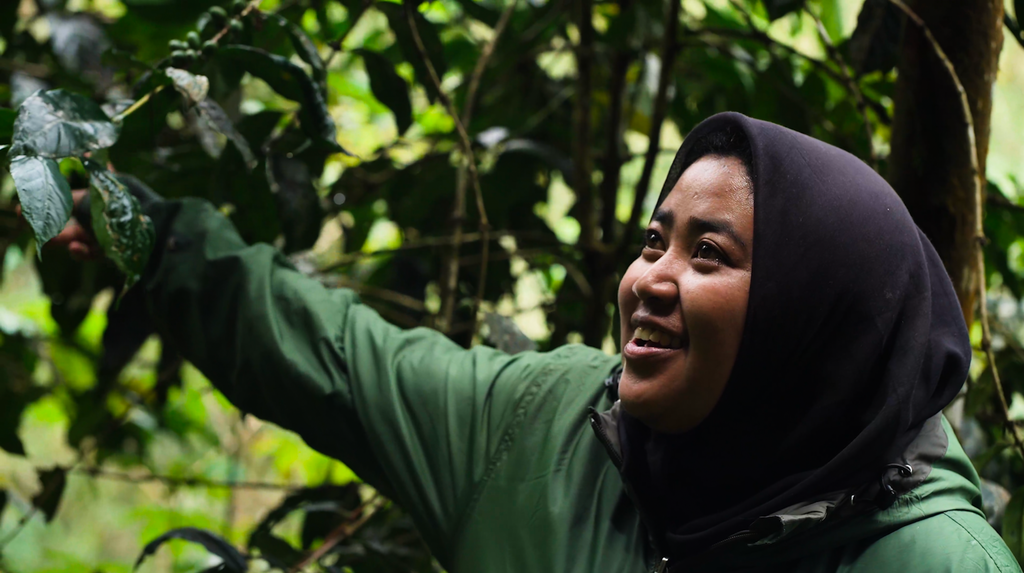The climate crisis has affected many aspects of our lives – even an often overlooked but most cherished way to start our day: our cup of coffee! Indonesia is one of the largest coffee producers in the world but the climate crisis has led to an increase of rainfall and floods in the country, affecting coffee production and impacting the livelihood of small-scale producers who are running 90% of the coffee plantations.
To overcome these challenges, small plantations like Lady Farmer Coffee are using renewable energy like solar energy to power their coffee driers. They are able to maintain the quality and taste of Indonesian coffee while motivating and empowering other farmers to join this line of business! In this way, the farmers can adapt to the challenges of the climate crisis as well as reduce emissions from their electricity consumption.

“Solar energy is definitely a change for us. Renewable energy is still rarely heard of here. The new solar panel and dryer method we are now using can help us demonstrate that women can compete in this industry,” says Farida Dwi, also known as Wiwi, the founder of Lady Farmer Coffee.
The plantation was started in 2016 in Karangkobar, Indonesia’s Central Java, by Wiwi and two other women, following Wiwi’s vision to make excellent coffee that is capable of competing with other coffee brands. “Lady Farmer is here because we want to empower women around this area to become farmers,” says Wiwi. The Lady Farmer Coffee Plantation now boasts 273 coffee trees of the Sigarar Utang coffee variety, all run by women responsible for the entire coffee production, from plantation to post harvesting, roasting the beans and packaging them to be sold.
Besides the challenges of running an agricultural business, they’ve also had to cope with the impacts of climate change. Coffee trees and coffee production are sensitive to environmental changes, and data shows that climate change has led to an increasing trend of rainfall in Java by 1,472mm per year. While coffee trees can act as a buffer to prevent landslides in a region that suffers from heavy rainfall, rain can nonetheless have adverse effects on the trees and their beans.
“Coffee trees need water from the air because it contains base compounds that are good for their growth. But if it is too much, the rainfall will ruin the tree itself,” says Wiwi. “The rainfall will affect the flowers, the sweetness in the flowers and later in the beans, the sweetness will disappear.”
The rain can also affect the beans’ drying process and, in turn, its quality. The lack of sunshine and heat can lead to changes in the beans’ flavour or cause them to self-ferment and become mouldy. Furthermore, the increasing cost of electricity in Indonesia has severely affected small businesses like Lady Farmer Coffee, as electricity subsidies are limited to non-commercial use.
Lady Farmer Coffee turned to solar energy to generate electricity for the bean drying process. Solar panels were installed with the help of the Diversity Movement, of which Greenpeace Indonesia is a part of, in a move to encourage the use of renewable energy to both adapt to and mitigate the effects of climate change.
According to research conducted by Soriano and Aguirre, the installation of a solar dryer that operates with clean and renewable energy can reduce bean drying time by 40% and reduce costs by as much as 35%. This allows Lady Farmer coffee roasters to ensure uniformity in the drying of the coffee beans and a consistency in bean quality while also turning a profit – despite the weather uncertainties in the area.
For Lady Farmer Coffee, renewable energy has proven to be a means of both economic and female empowerment in Central Java. “This is a first for us and we are willing to learn together with others,” says Wiwi. “We are really thankful for this.”
Adila Isfandiari is Climate and energy campaigner, Greenpeace Southeast Asia – Indonesia
This story first appeared at common-power.org. If you like this story, you can become a Common Power Ambassador, anyone can! Just register here. You will be receiving stories like this to share in your social media and you will help us spread the word!
